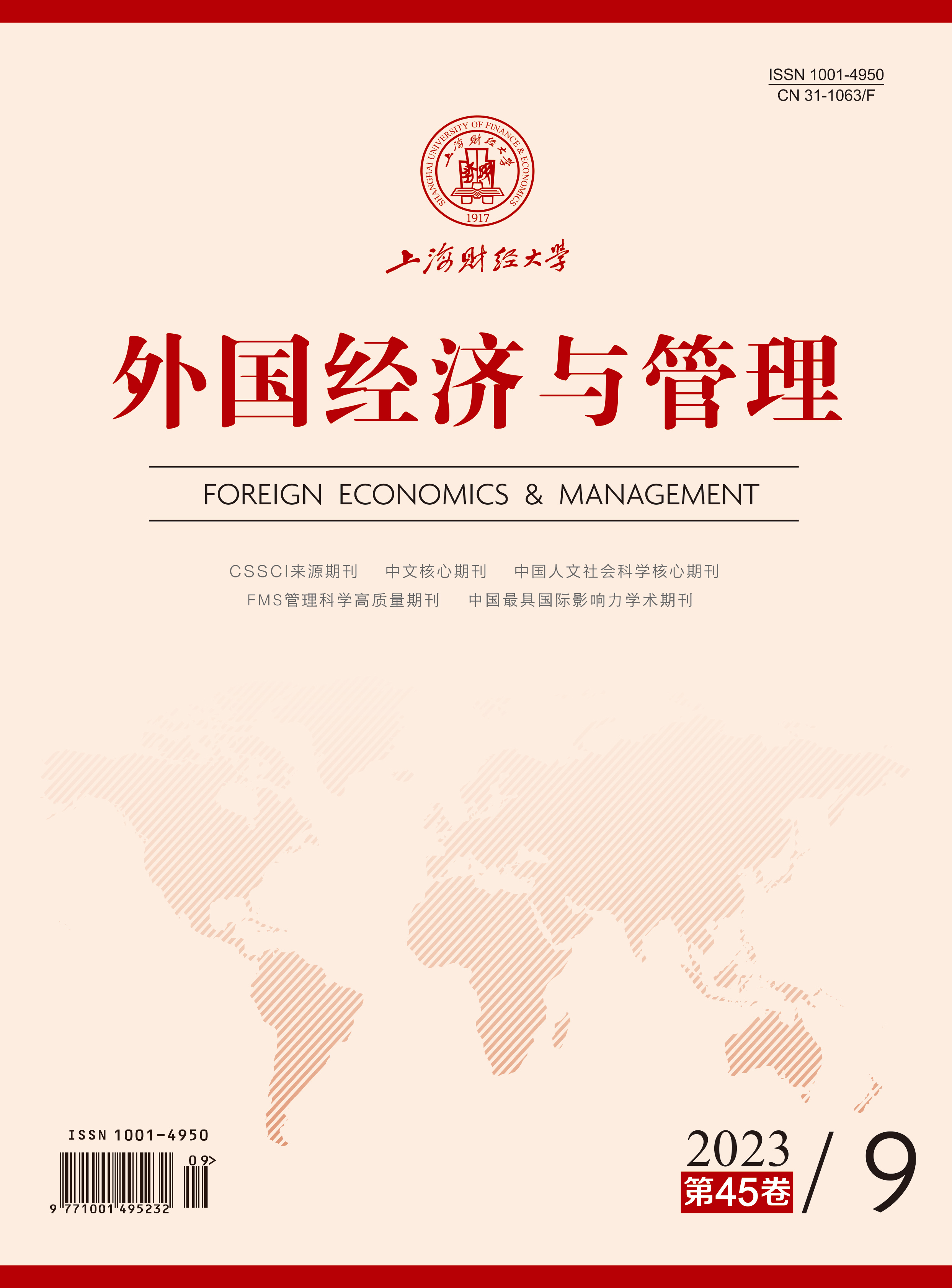对企业创新失败的容忍是激励管理层开展创新活动的重要条件。本文以2010—2020年中国A股上市公司作为研究样本,从“容错机制”视角探究了企业数字化转型与研发创新之间的内在影响机理。研究发现,企业数字化转型能够促进企业研发创新水平的提高。影响机制检验表明,企业数字化转型降低了管理层因创新失败导致的薪酬降低和职业生涯风险,有效地提高了企业对管理层创新失败的容忍度,证实了企业数字化转型通过“容错机制”激励企业创新这一影响机制。异质性检验发现,当企业会计信息质量较差、高管持股数量较低以及产品市场竞争程度较低时,企业数字化转型对研发创新的促进作用更为显著。最后,创新产出结果显示,企业数字化转型显著促进企业发明专利的增加,有助于推动企业高质量创新。本研究丰富了管理层创新激励的相关文献,为如何提高管理层的创新积极性以及高质量创新提供了经验证据。
企业数字化转型、容错机制与研发创新
摘要
参考文献
1 刘淑春, 闫津臣, 张思雪, 等. 企业管理数字化变革能提升投入产出效率吗?[J]. 管理世界, 2021, 37(5): 170-190,13. DOI:10.3969/j.issn.1002-5502.2021.05.014
3 吴非, 胡慧芷, 林慧妍, 等. 企业数字化转型与资本市场表现——来自股票流动性的经验证据[J]. 管理世界, 2021, 37(7): 130-144,10. DOI:10.3969/j.issn.1002-5502.2021.07.010
5 杨国超, 芮萌. 高新技术企业税收减免政策的激励效应与迎合效应[J]. 经济研究, 2020, 55(9): 174-191. DOI:10.3969/j.issn.1673-291X.2020.09.071
6 Acharya V V, Baghai R P, Subramanian K V. Labor laws and innovation[J]. The Journal of Law and Economics, 2013, 56(4): 997-1037. DOI:10.1086/674106
7 Aghion P, Van Reenen J, Zingales L. Innovation and institutional ownership[J]. American Economic Review, 2013, 103(1): 277-304. DOI:10.1257/aer.103.1.277
8 Allred B B, Park W G. Patent rights and innovative activity: Evidence from national and firm-level data[J]. Journal of International Business Studies, 2007, 38(6): 878-900. DOI:10.1057/palgrave.jibs.8400306
9 Armstrong C S, Guay W R, Weber J P. The role of information and financial reporting in corporate governance and debt contracting[J]. Journal of Accounting and Economics, 2010, 50(2-3): 179-234. DOI:10.1016/j.jacceco.2010.10.001
10 Boland R J, Lyytinen K, Yoo Y. Wakes of innovation in project networks: The case of digital 3-D representations in architecture, engineering, and construction[J]. Organization Science, 2007, 18(4): 631-647. DOI:10.1287/orsc.1070.0304
11 Bostan I, Mian G M. Inventor chief executive officers and firm innovation[J]. International Review of Finance, 2019, 19(2): 247-286. DOI:10.1111/irfi.12266
12 Bronzini R, Iachini E. Are incentives for R&D effective? Evidence from a regression discontinuity approach[J]. American Economic Journal:Economic Policy, 2014, 6(4): 100-134. DOI:10.1257/pol.6.4.100
13 Ederer F, Manso G. Is pay for performance detrimental to innovation?[J]. Management Science, 2013, 59(7): 1496-1513. DOI:10.1287/mnsc.1120.1683
14 Francis B B, Hasan I, Sharma Z, et al. Motivating high-impact innovation: Evidence from managerial compensation contracts[J]. Financial Markets, Institutions and Instruments, 2019, 28(3): 291-318. DOI:10.1111/fmii.12115
15 Frynas J G, Mol M J, Mellahi K. Management innovation made in China: Haier’s rendanheyi[J]. California Management Review, 2018, 61(1): 71-93. DOI:10.1177/0008125618790244
16 Griffin D, Li K, Xu T. Board gender diversity and corporate innovation: International evidence[J]. Journal of Financial and Quantitative Analysis, 2021, 56(1): 123-154. DOI:10.1017/S002210901900098X
17 Hirshleifer D. Managerial reputation and corporate investment decisions[J]. Financial Management, 1993, 22(2): 145-160. DOI:10.2307/3665866
18 Holmström B. Managerial incentive problems: A dynamic perspective[J]. The Review of Economic Studies, 1999, 66(1): 169-182. DOI:10.1111/1467-937X.00083
19 Jones C I, Williams J C. Too much of a good thing? The economics of investment in R&D[J]. Journal of Economic Growth, 2000, 5: 65-85. DOI:10.1023/A:1009826304308
20 Kaplan S N, Minton B A. How has CEO turnover changed?[J]. International Review of Finance, 2012, 12(1): 57-87. DOI:10.1111/j.1468-2443.2011.01135.x
21 Luong H, Moshirian F, Nguyen L, et al. How do foreign institutional investors enhance firm innovation?[J]. Journal of Financial and Quantitative Analysis, 2017, 52(4): 1449-1490. DOI:10.1017/S0022109017000497
22 Manso G. Motivating innovation[J]. The Journal of Finance, 2011, 66(5): 1823-1860. DOI:10.1111/j.1540-6261.2011.01688.x
23 Tong T W, He W L, He Z L, et al. Patent regime shift and firm innovation: Evidence from the second amendment to China’s patent law[J]. Academy of Management Annual Meeting Proceedings, 2014, 2014(1): 14174.
24 Verhoef P C, Broekhuizen T, Bart Y, et al. Digital transformation: A multidisciplinary reflection and research agenda[J]. Journal of Business Research, 2021, 122: 889-901. DOI:10.1016/j.jbusres.2019.09.022
25 Xie F, Zhang B H, Zhang W R. Trust, incomplete contracting, and corporate innovation[J]. Management Science, 2022, 68(5): 3419-3443. DOI:10.1287/mnsc.2021.4055
26 Zhai H Y, Yang M, Chan K C. Does digital transformation enhance a firm’s performance? Evidence from China[J]. Technology in Society, 2022, 68: 101841. DOI:10.1016/j.techsoc.2021.101841
27 Zhong R. Transparency and firm innovation[J]. Journal of Accounting and Economics, 2018, 66(1): 67-93. DOI:10.1016/j.jacceco.2018.02.001
引用本文
王靖茹, 姚颐. 企业数字化转型、容错机制与研发创新[J]. 外国经济与管理, 2023, 45(9): 38-53.
导出参考文献,格式为:





 5589
5589  4484
4484

